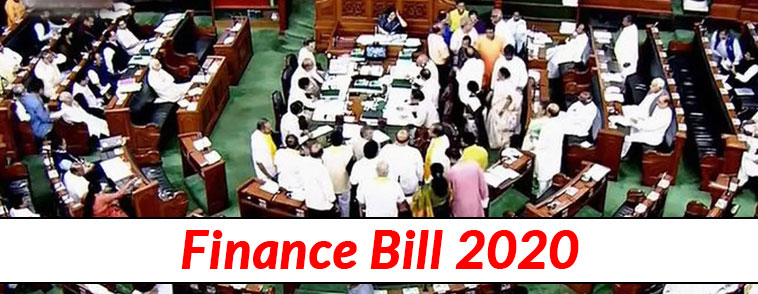
As the house curtailed its sittings in the wake of the Covid-19 outbreak, Lok Sabha passed the Finance Bill 2020 with amendments, without any discussion. The finance bill 2020 was quickly passed in the Lok Sabha without the customary discussion or reply by the Union finance minister and duly returned by the Rajya Sabha as the country headed for a lockdown to fight the Covid-19 crisis.
Rajya Sabha Chairman M. Venkaiah Naidu and Lok Sabha Speaker Om Birla met political leaders to strike a deal to clear the important bill before Parliament was adjourned.
The Government introduced more than forty changes to the Finance Bill, which was moved for consideration and passing by Finance Minister Nirmala Sitharaman.
Minister of State for Parliamentary Affairs Arjun Ram Meghwal said it was an “extraordinary situation” and that a decision to pass the bill without any discussion was taken at the all-party meeting.
The House negated amendments moved by Opposition members. The key changes introduced in the Bill are:
- NRIs – Non-Resident Indians will be taxed on India-controlled income above Rs 15 lakh.
- Equalization levy of 2% on non-resident e-commerce unless they have a PE in India
- Exemption in tax to Sovereign Wealth Fund enlarged to Pension Funds for infra investment.
- Tax on cash withdrawal of over Rs 20 lakh at the rate of 2% if tax return not filed for three years with effect from July 1, 2020.
- TDS rate on payment of dividend to non-resident, a foreign company at 20 percent with effect from October 1, 2020.
- DDT exemption will be given to REITs and InvITs if not under the new corporate tax regime.
- No 2 percent tax on withdrawal of over Rs 1 crore cash from banks, co-operative banks, PO.
- Tax on cash withdrawal of over Rs 1 crore at 5 percent if tax return not filed for three years with effect from July 1, 2020.
On March 23, 2020, Finance Minister Nirmala Sitaraman introduced the Finance Bill, 2020. The bill was introduced and passed in Lok Sabha without any discussion.






 NIACL Administrative Officer 2021 Interview Schedule Released
NIACL Administrative Officer 2021 Interview Schedule Released IOCL is hiring for 1968 Apprentice Posts – View Details and Apply Now
IOCL is hiring for 1968 Apprentice Posts – View Details and Apply Now IDBI to recruit 226 Manager, AGM, DGM posts, registration begins June 25
IDBI to recruit 226 Manager, AGM, DGM posts, registration begins June 25 DRDO Scholarship Scheme for Girls – Registration Starts Tomorrow
DRDO Scholarship Scheme for Girls – Registration Starts Tomorrow Agneepath Scheme 2022 – अग्निवीर भर्ती age limit, salary, how to join
Agneepath Scheme 2022 – अग्निवीर भर्ती age limit, salary, how to join